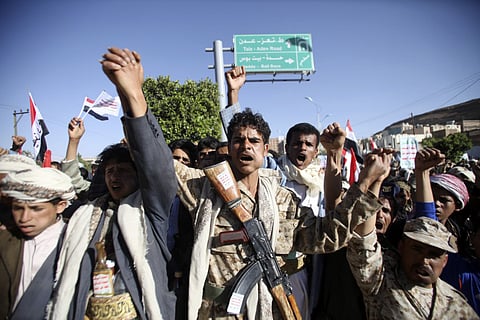The Iranian fiasco unfolding in Yemen
Obama’s key miscalculation in the Middle East was believing that the Islamic republic would be satisfied with a minor regional role

Iranian miscalculations in the Arab World, especially as Tehran seeks to project power from Iraq and Yemen, will probably lead to a fallen record. In the past, such interferences failed to measure Tehran’s limited abilities and, more important, reinforced the clerics’ errors in believing that opponents would not challenge them. Even the highly controversial negotiations over the country’s nuclear programme with leading western powers, which many Iranians suppose gives them an edge over regional affairs, will not make a dent. Why then is Iran hell-bent to waste its opportunity to become a normal country, create wealth and prosperity for its people, and add value to mankind?
Although much has been written about Iranian involvement in Iraq and Syria, only anecdotal evidence surfaced about its role in arming Al Houthi tribesmen who orchestrated a coup d’etat in Yemen. It was easy to temporarily oust President Abd Rabbo Mansour Hadi, though Al Houthis could not impose their will on the Yemeni population. Hadi, who remains the only viable option for this transitional period, fled his residence in Sana’a where he was under virtual house arrest and took refuge in the southern city of Aden from where he intends to resume his presidential duties.
His January 22, 2015 resignation, apparently made under duress, was rescinded after he signed several documents on Sunday as the “president of the republic of Yemen”. He even called Al Houthi actions taken after September 2014 illegitimate. Buoyed by hundreds of thousands of Yemenis who protested in Sana’a, Taiz and elsewhere against Al Houthis, Hadi’s move literally nullified what rival factions agreed to a few days ago — to create UN-brokered transition councils that, for all practical purposes, established equality among warring factions that did not deserve such parity.
Although what might happen next in Yemen is still murky, the fate of the embattled nation is still very much in the air, with a distinct possibility of renewed civil war that will tear the country apart. Few should doubt that Tehran will back Al Houthis from Sana’a given that Iran is determined to hold on to its gains.
Strangely, Washington seems baffled by Al Houthis, unaware of, or unwilling to label Iranian-backed militias as terrorists, since the American narrative was to more or less exclusively reserve that label for Al Qaida. It was an eerie tale that belied reality on the ground. Indeed, the Obama administration seldom tackled the crisis from the perspective of what was actually occurring on the ground and concluded that Iran was the key to its preferred solutions whereas Tehran was the problem itself.
Much like the mistaken Nixon administration, whose 1971 ‘Twin Pillars’ policy intended to create a balance of power between Iran and Saudi Arabia, Obama opted to copy that stale model to resurrect a regional security architecture in which Tehran and Riyadh would compete. The additional feature that was added to the mix in the post-2011 version was to neutralise both countries.
In Yemen, and unlike what brainy decision-makers concluded, everyone discovered that the Arab World was more than Al Qaida and Hezbollah. Still, this is a secondary concern since President Barack Obama initiated secret negotiations with Tehran starting in July 2012, which sealed the fates of both Iraq and Syria.
Obtuse views
Obama chose to overlook the use of chemical weapons by the Damascus regime in August 2012, saying that he would change his calculations significantly if this proved to be accurate. It was. Without any changes coming from the White House. The thousand or so human beings who perished in that attack, and similar ones at other times, were mere statistics even if the evidence was incontrovertible. For Obama, there were more important geopolitical negotiations underway, and the priority was elsewhere. In fact, neither Iraq nor Syria nor Lebanon nor, for that matter, the conservative Arab Gulf monarchies, were important. What motivated the American president was his Iran policy to reinforce a “geopolitical equilibrium.”
In the words of one of America’s intellectual paragons, former Alaska Governor and one time vice-presidential candidate, Sarah Palin, “Let Allah sort it out”. This was what everyone thought in private but were too diplomatic to reveal. Such an avowal would have been funny were it not woefully illiterate, though the source confirmed the assertion.
Obama administration minions echoed similarly obtuse views, of the “pity they can’t both lose” variety that, sadly, ignored the fate of millions of human beings.
What Obama missed in the Middle East, which proved to be a significant error in retrospect, was the notion that Iran would be satisfied with a minor regional role. On the contrary, and as it is now amply evident in Yemen, Iranian leaders intend to win everywhere. Indeed, it is safe to conclude that Iran now controls four Arab capitals — Baghdad, Beirut, Damascus and Sana’a — and, perhaps, even holds Washington captive.
Under the circumstances and, amazingly, both the US and Iran seem to be led by leaders immersed in vanity, unaware that their actions will generate counter-actions.
Credit: Dr Joseph A. Kechichian is the author of the forthcoming ‘Iffat Al Thunayan: An Arabian Queen’, London: Sussex Academic Press, 2015.



